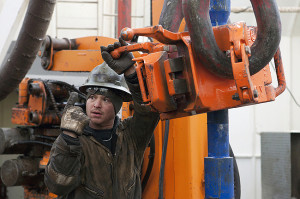Fracking: The antidote to a lagging economy and a foreign oil addiction

By Rubem Hofliger and Carlo Maffatt | Nevada Watchdog
LAS VEGAS —America is shaping up to become one of the top oil producers in the world.
Reuters reported the U.S. is increasingly less dependent on oil produced abroad, largely due to new technologies such as “fracking,” which allows the extraction of oil and gas deposits from sedimentary rock.
The economic crisis that began in 2008 forced American oil and gas producers to seek new and more economical methods of exploration and production of energy. The result has been astonishing for some local economies.
JOBS BONANZA IN NORTH DAKOTA: Increased domestic oil production is key to boosting the economy and national security.
According to CNNmoney, states like North Dakota are reaping the benefits of the shift. It has one of the lowest unemployment rates in the country due to its oil industry and cities such as Williston now generate jobs that pay more than $100,000 a year.
A stronger economy isn’t the only plus. Less reliance on foreign oil liberates us from the extortion, corruption and security threats posed by some of the oil-producing countries.
Since the 1970s, we’ve had to look elsewhere for oil to meet our growing energy needs. It has become commonplace to do business with countries who are openly hostile to American values and culture.
Buying oil from conflict-plagued nations such as Saudi Arabia, Iran, Iraq and Venezuela indirectly funds regimes that go against our global interests and national security. In some cases, we have resorted to financing wars with some of these countries to keep the oil flowing.
Gasoline prices have skyrocketed in recent years, mainly due to the instability of these oil-producing nations. Conflicts in the Middle East habitually set off price hikes. During the Gulf War gas prices shot up to $5 a gallon. These spikes set off a snowball effect that ends up triggering price increases across the board and in almost all products, in addition to reducing the competitiveness of our exports to global markets. In effect, everything becomes more expensive.
Harold Hamm told Forbes magazine “Never again are we going to be held hostage and extorted.” The Wall Street Journal says “greater U.S. oil production gives foreign-policy flexibility.” And Time Magazine says “OPEC’s oil has been diminished, and can no longer be used as the weapon the way it was 40 years ago.”







